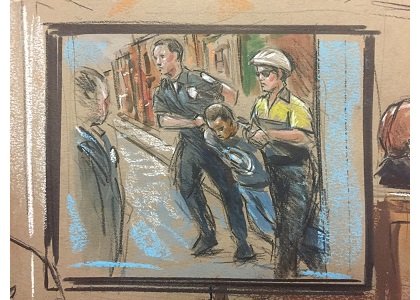BALTIMORE (CNN) — Baltimore braced for possible unrest as jurors began deliberations in the first of six trails related to the death of Freddie Gray, who died after suffering a spinal cord injury while in police custody in April.
Officer William Porter is charged with one count of involuntary manslaughter, second-degree assault, misconduct in office and reckless endangerment.
If convicted, the officer faces a maximum sentence of 10 years or a minimum of probation.
The scheduling of the trials by prosecutors has been watched closely and is considered key. In future trials, Porter is expected to implicate other officers.
In September, prosecutors said the order of the trails was important because, if officers who incriminate their fellow officers aren’t tried first, they might refuse to take the stand to avoid self-incrimination in their own trials, The Baltimore Sun reported.
Ready for unrest
With a verdict imminent, the city of Baltimore — which witnessed protests and unrest after Gray’s death — activated its emergency operations center “out of an abundance of caution.”
Last week, Baltimore Mayor Stephanie Rawlings-Blake and Police Commissioner Kevin Davis cautioned the city to be respectful as the verdict gets closer.
“Whatever the jury decides, we must all respect the process,” the mayor said last week. “If some choose to demonstrate to express their opinion, that is their right, and we respect that right, and we will fight to protect it. But all of us today agree that the unrest from last spring is not acceptable.”
Davis sent a letter to the police force on Monday, saying, “Regardless of the outcome of this trial or any future trial, we refuse to surrender to the low expectations of those who wish to see us fail. … We serve because we know so many good and decent Baltimoreans need us to stand in between them and crime, disorder, and chaos.”
Baltimore police canceled leave for officers who had days off from Monday through Friday. Officers will be scheduled to work 12-hour shifts instead of the usual 10 hours.
‘How long does it take to click a seat belt?’
During Monday’s closing arguments, prosecutor Janice Bledsoe argued that any officer in Porter’s situation would have called for medical assistance once Gray complained.
“‘I need a medic,'” the prosecutor said, quoting Gray. “How long does that take? How long does it take to click a seat belt and ask for a medic? Is two, three, maybe four seconds worth a life? That’s all it would have taken.”
But during earlier testimony Porter testified that Gray didn’t ask to be transported to the hospital until the fourth of six stops along the 45-minute ride to the police station after his arrest. Porter relayed the information to the driver, he testified, but he didn’t call a medic because Gray didn’t appear to be injured and didn’t articulate what was wrong.
But using video clips of Porter’s statements and video from the scene, prosecutors argued that Porter knew that Gray was too injured to be booked into jail, but did nothing.
“You are looking into the wagon and then you turn your back on Freddie Gray,” Bledsoe said.
By Porter doing nothing and closing the doors of the wagon, knowing Gray was not OK, the prosecution said, “that van became his casket on wheels.”
Authorities say Gray broke his neck on April 12 while being transported in the police van, shackled but not wearing a seat belt. He died a week later, spurring widespread violence.
‘An absolute absence of evidence’
During his closing arguments, defense attorney William Murtha said the prosecution’s case was full of holes, citing “the absence of real evidence.”
“The state is asking you to insert facts into the blanks that don’t exist,” he told jurors.
Murtha told the jury that the law requires them to reach a verdict based on the “standard of a reasonable police officer.”
“There is an absolute absence of evidence that officer Porter acted in an unreasonable manner,” he said.
Never secured
During his four-hour testimony Wednesday, Porter said that of the roughly 150 prisoners he has placed in police wagons since joining the Baltimore Police Department in 2010, none was secured with a seat belt — in part, out of concern for officers’ safety while in the wagon’s tight quarters.
Prisoners were never secured with seat belts during field training, and though cadets were instructed to secure prisoners with seat belts, they were not shown how, Porter said.
The jury — made up of three black men, four black women, three white women and two white men — is expected to resume deliberations at 8:30 a.m. ET Tuesday.
CNN’s Carolyn Sung and Aaron Cooper reported from Baltimore, and CNN’s Ed Payne wrote this story from Atlanta
